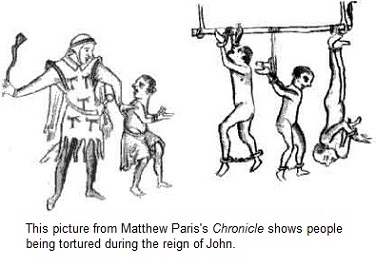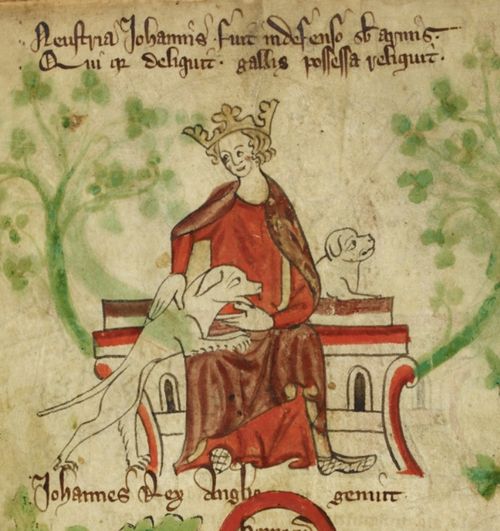
Bad King John?

1 King John
This is a typical description of King John from Newnes Pictorial Knowledge an old children's encyclopaedia written in the 1930s. Make a list of all the words which describe what kind of person John was.
A cold-hearted, selfish man sat alone in a quiet room in a palace, and his thoughts were cunning and bad. It was John, the king who, by his weakness and foolishness, would unite the whole nation against him. During the 17 years of his reign, John had three great quarrels.
The first was with the King of France. In fighting him, John lost Normandy altogether.
John's second quarrel was with the Church. At last, the Pope said that John was king no longer and he threw him out of the Church. This scared John so much that he gave in utterly.
John's third and worst quarrel was with his own subjects. His cruelty and selfishness lost him the support of the whole nation. His cowardice in the affair with the Pope disgusted them. He tried to bully his nobles, but in this, too, he failed. They drew up the Magna Carta and demanded that the king should sign it. The king was helpless to stop them.
Links:
The following websites will help you research further:
The Reign of John:
Short biography on the
BBC website
Old textbook
account in
SB Harding,
The Story of England (1909)
Our Island Story - children's writer HE Marshall (1905) tells
the story of John and Arthur.
Clip from the
History Files:
King John 'Lackland' Typical portrayal of an
'evil' King John by the actor Oscar Isaac in the film Robin Hood (2010)![]()
Introduction The Worst King Ever?
King John (1199-2016) was the son of Henry II. For many years, historians thought that he was a bad king 'the worst king ever to have sat on the throne'.
Here are three things he was accused of doing:
1. He murdered his 16-year-old nephew Arthur in a drunken rage, and
threw his body into the river.
This story was written by a monk-chronicler from Margam Abbey in Glamorgan. Margam Abbey was given money by William de Braose, a great enemy of King John.
2. He tortured and murdered Geoffrey, a priest who critised him.
This story was written by Roger of Wendover, a monk-chronicler who was writing after 1230 (John died in 1216). It is known that John made Geoffrey Bishop of Ely, and that Geoffrey was still alive in 1225, years after John's death.
3. He gave orders for his wife's lovers be strangled on her bed.
This was written by Matthew Paris, a monk-chronicler writing in 1250.
Do you believe these accusations? In the Middle Ages, all the books were written by monks. In 1208, King John had quarrelled with the Church, so most monks hated him. Did the monks exaggerate his faults? King John had a bad reputation ... but did he deserve it?
Many historians say that he did. In 2009 medieval historian Nicholas Vincent told BBC Radio 4 that John really was an absolute rotter through and through; the worst king in English history.
Here are some of John's failures that are undeniable facts:
4. He lost Normandy, which was conquered by Philip II, king of France.
5. He lost his quarrel with the Church, and had to accept the Pope as his overlord.
6. He lost his quarrel with the barons, and had to accept the Magna Carta.
7. In 1216, Louis Capet, Philip II's son, invaded England.
Study this webpage, then answer the question sheet by clicking on the 'Time to Work' icon at the top of the page.
2 King John and his Dogs
This picture from the time shows King John with his dogs. Does it support the monks' claim thatJohn was an inhuman monster?

... continued John's reign
Most modern historians think very differently about John. One of them, Maurice Ashley, has written the following things about King John:
1. He was a hard-working king, who travelled round the whole country even in winter.
2. He was the first king to keep proper records of government documents.
3. He improved the law courts, and made the barons obey the law.
4. He was a faithful Christian, and gave money to the Church and to the poor.
5. He was a good army commander.